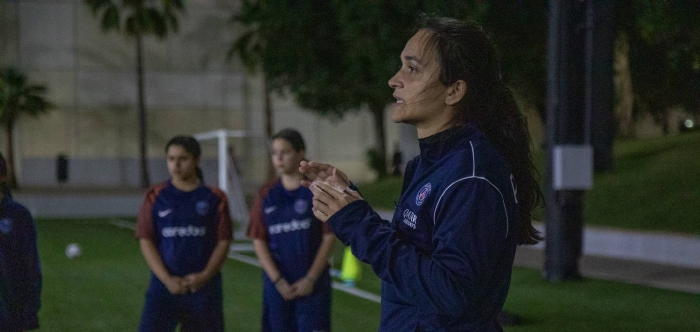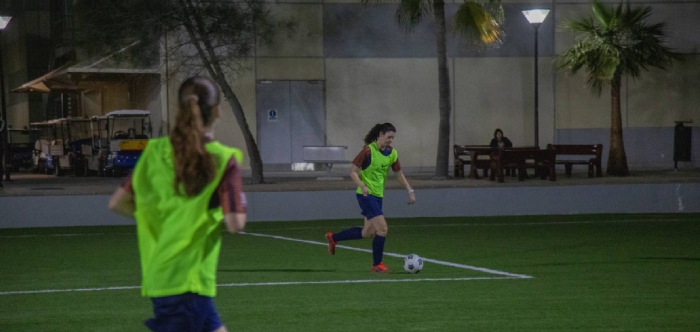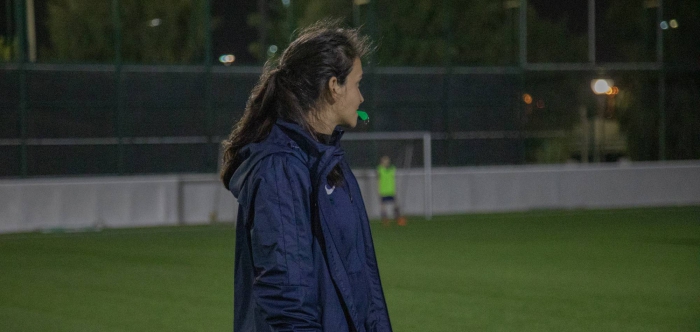Talyta França
Opinions questioning the authenticity of the growing interest in female football in Qatar since the 2022 World Cup have become a common thread in online football discussions. Some argue it's just a temporary hype, but beneath the surface, there's a narrative challenging these notions, with girls on the pitch proving that this shift is more than just a passing trend.
For a country that aims to become a sports hub, Qatar has gained international attention after hosting the World Cup. The country has attracted not only the eyes of numerous tourists and media attention but also the attention of girls and women in Qatar who, in addition to having had the opportunity to attend games in the stadiums, also had the chance to attend related activities such as the FIFA Fan Festival at Al Bidda Park.
The success of the World Cup in spurring Qatari women's participation in sports has also been evident following the Women’s World Cup 2023 held in Australia and New Zealand, where the Morocco national team made history as the first Arab women’s squad to qualify. According to a FIFA report published in 2023, there was an increase of nearly 16.6 million women and girls participating in organized football worldwide, reflecting a 25% rise from 2019.
Qatar hosting the World Cup has strengthened the connection between Qatari women and football, according to Dr. Kamilla Swart-Arries, associate professor and director of the Sport and Entertainment Management master’s degree program at Hamad Bin Khalifa University. “We are looking at the structural changes as a consequence of the World Cups,” Dr. Swart-Arries said. “So the increased awareness of this also has led to maybe more parents allowing the girls to go and play football as an example. That's the behavior change. Once they start playing, they may have an interest in playing more competitively.”

Aya Kassem coaching the PSG Academy Qatar women's elite team during training. Picture: Talyta França.
The impact and repercussions of the World Cups are being reflected in initiatives taken by organizations and academies. According to Aya Kassem, a former professional player for the Lebanese national team and head of the female program at PSG Academy in Doha, there has been an 80% increase in female registration in the football academy since Qatar hosted the World Cup. Dana Hayek, 22, who earned a communication degree from Northwestern University in Qatar in 2023 and is a football player at PSG Academy, attests to the shift. “There has been a noticeable increase in initiatives to promote and support female players in PSG Academy, including enhanced training programs,” she said.
As Qatar continues to push for progress in women’s sports, specific challenges persist. Despite the advancements, Hayek, who joined the Qatar national women’s team at the age of 13, points out, “There is still room for further support and development, especially in areas such as additional sponsorships to elevate women's football in the country.” Resources for women’s football are relatively limited compared to those invested in men’s football, which Hayek says is linked to Qatari women’s historical underrepresentation in sports.

Dana Hayek playing during PSG Academy Qatar women's elite team training. Picture: Talyta França.
The structural challenges reflect barriers that are still present in female football, with Aya Kassem noting that providing opportunities for male players is easier than for females. “Whenever you look around, there's a boy's team or a club or an academy that you can always do a competition with. But for girls, to gather them and to give them competitions and to give them international opportunities, it's always a challenge, but we still do it.”
Obstacles also transcend the participation of female athletes. More women coaches, referees, and managers are needed according to Dr. Swart-Arries. “That's key in terms of investment, in terms of developing this capacity among women - building up the ecosystem.”

Aya Kassem coaching the PSG Academy Qatar women's elite team during training. Picture: Talyta França.
Aya Kassem, who coaches over 30 girls, including the elite team at the PSG Academy, emphasizes the need to bolster the creation and development of female clubs and the women’s national team in Qatar. “We are giving our maximum. There could be more, but it's not in our hands. The ‘more’ is in the hands of the federations and the clubs.”
After the FIFA World Cup 2022 in Qatar and the Moroccan’s team's historic achievement in the Women’s Cup 2023, women’s football in Qatar is slowly gaining momentum. “The challenge now is to maintain it,” Aya Kassem said. “Not for a phase that's before, during, or after the World Cup, but for a long time.”